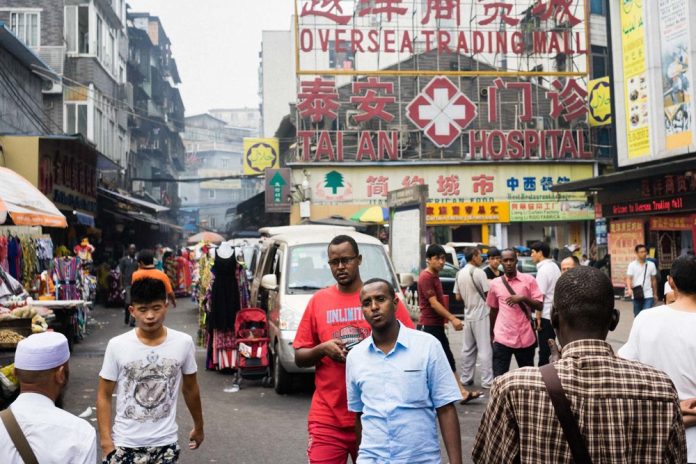From South African wine to made-in-Ethiopia shoes, Africa’s exports to and investment in China is on the rise, adding a new twist to the standard Africa-China narrative.
Stories abound of China’s business foray into Africa. Of the $67 billion in investments in Africa made collectively by the United States, Britain, France and the BRIC countries (Brazil, Russia, India, China, South Africa), China alone accounted for $27.7 billion, making it the continent’s biggest business and trade partner.
The China-Africa relationship is more than a one-way deal, however. In 2012, cumulative investment in China by Africans totaled $14.2 billion in China, up 43 percent from 2009. The number of Africans living in China also is increasing. At the latest count, China is home to more than 200,000 Africans, mostly traders.
“In the first nine months of 2014, Guangzhou, a southern Chinese city hosting the largest African community in Asia, documented 430,000 arrivals and departures at its checkpoints by nationals from African countries,” a United Nations report says. In Guangzhou, for example, predominantly African neighborhoods have earned them such nicknames “Chocolate City” and “Little Africa.”
Several African countries, including South Africa and Ethiopia, are aggressively touting their products in China. According to a Chinese government white paper on economic and trade cooperation between China and Africa, Mauritius, South Africa, Seychelles, and Nigeria are among the top African investors in the Asian giant.
Deborah Brautigam, Bernard L. Schwartz Professor of International Political Economy and director of the International Development Program and the China Africa Research Initiative at Johns Hopkins University’s School of Advanced International Studies in Washington, D.C., confirmed the growing investment trend from Africa into China in an interview with Africa Strictly Business.
“Yes, Africans are investing in China. This includes large African corporations like Standard Bank and South African-owned brewery SABMiller. It also includes smaller companies like Innoson in Nigeria investing in Chinese manufacturing and many trading companies setting up trade centers,” she said, referring to the Innoson Group of Companies, manufacturers of vehicles and industrial and household products.
SABMiller’s Snow beer, produced and sold only in China under a 1990s joint venture with Beijing-backed China Resources Enterprise, is the world’s best-selling beer by sales volume. The SABMiller-China Resources venture, operating as China Resources Snow Breweries, not only produces a variety of other popular Chinese beer brands, but it also is the largest brewery in China. In all, SABMiller co-owns more than 90 breweries with Chinese Resources, producing some 30 beer brands with a 23-percent market share.
Among other long-standing African investors, Tunisia invested in China’s fertilizer production back in1984 under a joint initiative, Sino-Arab Chemical Fertilizers Co. The company now is one of the largest compound fertilizer producers in China.
The substantial investments in China by Mauritius and Seychelles have been called into question. In 2009, for example, investments by Seychelles into China topped $100 million, well above the $7 million China invested in the Indian Ocean archipelago the same year. The explanation may lie in the fact that business entities and entrepreneurs worldwide like the relaxed taxation and light regulation of corporate activities in both Mauritius and Seychelles. In its report on Africa’s growing business presence in China, the UN’s online publication, AfricaRenewal, quotes analysts as saying that the large number of offshore companies anonymously registered in its Indian Ocean islands could possibly be the answer to “this puzzle.”
Yun Sun, senior associate at Stimson Center and nonresident fellow at the Brookings Institute, agrees. “In the case of Mauritius and Seychelles, I’m personally not convinced that the capital [invested in China] was from these two countries to begin with. As offshore financial centers, they are excellent offshore investment channels for other investors to go through,” he told Africa Strictly Business. “[The Financial Times] reported a few years ago that Mauritius accounted for 42 percent of India’s [foreign direct investment] from 2000 to 2011. The money was certainly not just from Mauritius. But then all capitals look for investment opportunities with the highest returns. And the appeal of China is real. Mauritius and Seychelles are the offshore banking centers. I think this will be a long but consistent process.”
Most of the items going into China from Africa have been raw materials – iron, copper, crude oil, platinum, and a number of other commodities.
“The Chinese government indicated that most of the African investments are in petrochemicals, manufacturing industries, wholesale and retail industries. Two examples are the South African investment in Chinese Snow Beer and the Tunisian-China joint venture on a fertilizer company. As African economies grow, their capital surely will have the need to invest as well,” Sun said.
For Brautigam, African’s increasing investments in China marks a significant trend. While Africa because has been the object of foreign investment, Africans themselves do not have much experience in investing overseas.
“China is not a bad place to start. On the trade level, the investors come from across Africa. Of course larger countries like Nigeria tend to send more traders,” she said. “Africans invest in China for the same reasons anyone does: to secure access to Chinese markets, to facilitate trade, to take advantage of good manufacturing opportunities and other areas for profit.”
All capital looks for investment opportunities with the highest returns, and the appeal of China is real, Sun says. He argues, however, that it makes China look good to point out its imports from Africa.
“China sees this as important because it shows that China-Africa economic relationship is not a one-way street. So this is a Chinese counter-argument to refute the accusation of Chinese economic ‘invasion’ in Africa,” he said.













